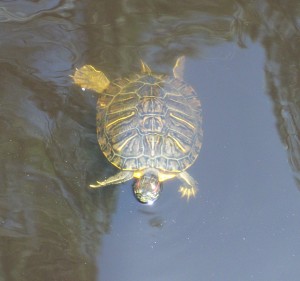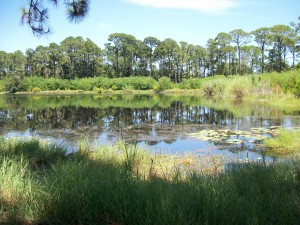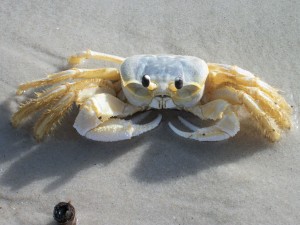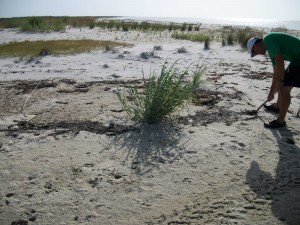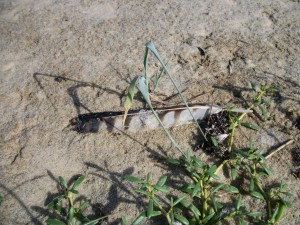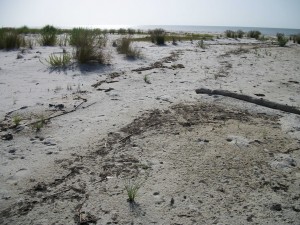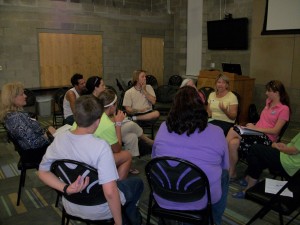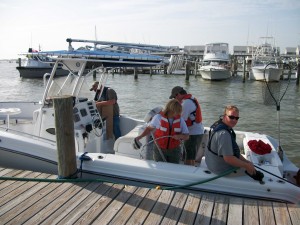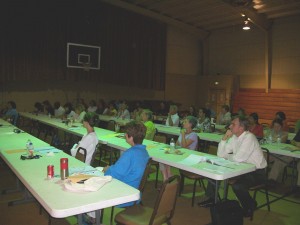Category Archives: Nature
Nobody Knows But Everyone Can Act
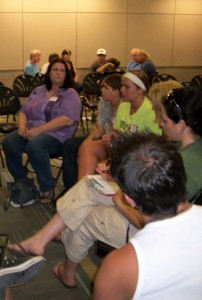
Small groups focused on specific topics and discussed experiences, ideas, and actions at the Future of the Gulf - Community Brainstorm, photographed July 21, 2010
With the tropics heating up and the approach of Tropical Storm Bonnie, various differences between the landfall of a hurricane and the waterfall of an oil spill come to mind. One major difference is our wealth of understanding about hurricane impact and damage as compared to our lack of understanding about this oil spill. How long will the effects of the oil remain in the gulf water? Nobody knows. How will the eco-system be changed as a result of the oil eruption? Nobody knows. With so many fishing areas closed now, is the toxicity of the gulf food chain going to get worse or better over the course of years? Nobody knows. What will become of the dispersants as they are released in the atmosphere, surface water, and deep water? Nobody knows. How long will tourism be affected? Nobody knows. How will the reputation of gulf seafood be affected over the long term? Nobody knows. What will be long-term physical and psychological effects on the people who live in coastal areas? Nobody knows.
With so many unknowns, some signs are definitely unsettling. Yesterday, I saw an oiled osprey feather on the beach, there were miles of somewhat sparse oil floating in the Mississippi Sound, and much of the beaches of Katrina Key (Dauphin Island west of Katrina Cut) have still not been cleaned up after three weeks. The wildlife is definitely stressed and there are far fewer shore birds on the Island. Today, I saw three freshly killed sea gulls within a mile of the Dauphin Island bridge and in the early morning I could smell a diesel-like smell (probably from dispersants) in the air all over Dauphin Island.
On the hopeful side of all this, many people are keeping informed, sharing ideas, and doing things to make a difference. Ask yourself, what are my action items? Think things out with friends. Network. Pray. Make a list. Ask yourself, what do I need to look up or investigate? What can I do to build up my community or protect the environment? What can I do today? Each person’s actions can make a difference.
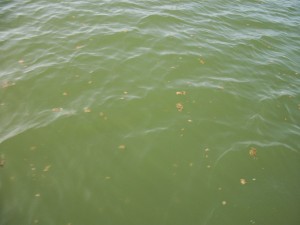 Surface oil in the Mississippi Sound north of the west end of Dauphin Island, photographed July 22, 2010 |
Ongoing Challenge
Now that the oil spill leak is potentially sealed, how soon will the ongoing Gulf oil problem be forgotten, out-of-sight and out-of-mind?
You are invited to a brainstorming meeting about continued community focus and action on the oil spill. The purpose of this meeting is to generate ideas on how people can continue their involvement with environmental, health, economic, and community needs, and how people can work to keep a disaster like this from happening ever again. Rachel Guillory of Oceana and Leo Denton will facilitate the meeting.
The Future of the Gulf Community Brainstorm will be Wedneday, July 21, 7:00 – 8:30 P.M. at the Shelby Center at the Dauphin Island Sealab at 101 Bienville Boulevard on Dauphin Island. See Facebook event too.
Below are two beautiful videos about the Gulf of Mexico.
What a People!
|
The gulf coast is not just home for tragedies and crises. It’s the home of incredible people! In 2004 numerous hurricanes struck Florida and the northern gulf coast including Hurricane Ivan. Other areas suffered greatly too particularly with Hurricane Jeanne. 2005 brought more destruction with numerous communities all along the coast from Central America to United States and throughout the Caribbean being devastated from severe hurricanes including Dennis, Emily, Katrina, Rita, and Wilma. With barely a breather if that, rough economic times came our way and are indeed affecting the whole world. And now we’re in month three of the oil disaster. Today we are shocked at the inept care that was given to our environment and shocked at the long-term environmental destruction of our home and the home of so many other creatures too. Yet positive energy is the focus of so many people! “I love Dauphin Island!” “I love Bayou La Batre!” “I love Louisiana!” “I love Mississippi!” “I love my community!” “I care about you!” “Let’s help one another!” “Let’s take care of our environment!” We are a people who have kept coming back! We are a people who are still coming back today! With confidence, even after all this and with whatever will come in the future, be it natural or unnatural disasters, I know that we will continue to live positively. There’s an incredible faith inside all of us, a faith that creates an unconquerable, spirited synergy between us, a faith that is lived out in innumerable acts of kindness, friendship, and generous initiative. |
Volunteer update
There is a new volunteer program being offered on the gulf coast called “peer listening.” Peer listening is a community service that proved valuable in the wake of the Exxon Valdez disaster. Training workshops are currently being conducted in Alabama and Mississippi coastal communities. According to the program’s website (which contains lots of helpful information), “peer listening is a type of support that occurs when people provide knowledge, experience, emotional, social or practical help to each other.” Pictured above is a training workshop that was held in Bayou La Batre yesterday.

